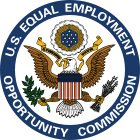 |
| Jefferson's Vision Endures |
In most general terms, Title VII, commonly referred to as the Civil Rights Act of 1964, prohibits unfavorable treatment in the in the workplace that exists or is undertaken because of an employee's race, color, sex, religious beliefs and practices or national origin.
Title VII was supplemented by the Age Discrimination in Employment Act of 1967, and was amended by the Americans With Disabilities Act of 1991 and the Pregnancy Discrimination Act of 1978.
Hence, where federal laws are concerned, discrimination based upon race, color, sex ,age, disability, pregnancy, religious beliefs or national origin is unlawful.
Title VII was supplemented by the Age Discrimination in Employment Act of 1967, and was amended by the Americans With Disabilities Act of 1991 and the Pregnancy Discrimination Act of 1978.
Hence, where federal laws are concerned, discrimination based upon race, color, sex ,age, disability, pregnancy, religious beliefs or national origin is unlawful.
To be Protected Under Federal Law, You Must File a Charge Within 300 Days
Federal discrimination laws apply to companies that have 15 or more employees, are initially administered by the EEOC and must be filed within 300 days of the earliest act of discrimination/retaliation.
Click Here to jump to Post outlining how to prove a discrimination claim.
Retaliation in Response to a Claim of Workplace Discrimination Under Federal Ant-Discrimination Laws is Illegal
Illegal retaliation exists when an employer takes "adverse employment action" (i.e. a demotion, failure to promote, termination, etc.) against a worker who previously had complained about conduct that he/she felt violated Title VII and/or other federal employment laws.
Every State Has an Anti-Discrimination Statute - Pennsylvania's Human Relations Act Makes Workplace Discrimination Because of an Employee's Race, Color, Sex, National Origin, Religious Beliefs/Practices, Ancestry, Familial Status, Age, Handicap and Disability
 |
| PHRA Both Prohibits Discrimination and Retaliation Based Upon a Worker's Age, Race, Color, Sex, Pregnancy, Familial Status, Religious Beliefs, National Origin or Disability. |
The Pennsylvania Human Relations Act ("PHRA" )is patterned after the federal ant-discrimination framework, and prohibits the very same forms of discrimination and retaliation as do the federal laws identified above.
The PHRA applies to companies that have 4 or more employees, are initially administered by the Pennsylvania Human Rights Commission ("PHRC") and must be filed within 180 days of the earliest act of discrimination/retaliation. So, if your employer has 4 or more but less than 15 employees, you file with PHRC.
Moreover, PHRA's addition of familial status, ancestry and handicap to the list of protected classes identified in like federal statutes means that it protects a broader class of persons than does its federal counterparts.
Click Here to jump to post discussing interplay between federal, state and municipal anti-discrimination statutes, and sexual orientation and gender identity protection.
All Claims of Illegal Employment Discrimination and Retaliation Must First Be Filed With the Appropriate Federal or State Administrative Agency So That the Employee Can "Exhaust All Administrative Remedies"
The government often seeks to limit the number of lawsuits filed in the court system. One way this is accomplished is by requiring the complaining party to "exhaust administrative remedies" prior to filing such suits.
Moreover, PHRA's addition of familial status, ancestry and handicap to the list of protected classes identified in like federal statutes means that it protects a broader class of persons than does its federal counterparts.
Click Here to jump to post discussing interplay between federal, state and municipal anti-discrimination statutes, and sexual orientation and gender identity protection.
All Claims of Illegal Employment Discrimination and Retaliation Must First Be Filed With the Appropriate Federal or State Administrative Agency So That the Employee Can "Exhaust All Administrative Remedies"
The government often seeks to limit the number of lawsuits filed in the court system. One way this is accomplished is by requiring the complaining party to "exhaust administrative remedies" prior to filing such suits.
You Can't "Start" In Court
Where such exhaustions requirement exist, as they do where discrimination complaints are concerned, a failure to follow the proper procedures, i.e. "a failure to exhaust administrative remedies," is fatal to the claimant's rights to pursue discrimination claims in court.
An Employee Believing He/She has Been Subjected to Unlawful Discrimination or Retaliation Under Federal Laws Must File a Timely Charge With the Equal Employment Opportunity Commission
The EEOC investigates Charges of Discrimination and Retaliation alleged under federal laws.
Any person believing he/she has been subjected to discrimination or retaliation in the workplace, and wants to pursue a remedy under any federal law identified above, must file a "Charge of Discrimination" with the EEOC within 300 days of the alleged act(s) giving rise to the claim, or any right to pursue such claims with EEOC or in court will be lost forever.
300 Days for Federal Claims
The Pennsylvania Human Rights Commission Investigates Charges of Unlawful Employment Discrimination Filed Under the Pennsylvania Human Relations Act
In Pennsylvania, the Pennsylvania Human Relations Commission ("PHRC") investigates any Charge of Discrimination or Retaliation filed by an employee pursuant to the PHRA.
 |
| Investigate Complaints of Discrimination Pursuant to the Pennsylvania Human Relations Act |
In order to preserve all of one's rights to prosecute a claim of discrimination or retaliation pursuant the PHRA, a Complaint setting forth the facts supporting the claim must be filed with PHRC within 180 days of the first act complained upon.
18-Days For Claims Under State Law
A failure to meet that 180-day deadline is deemed "a failure to exhaust administrative remedies," and such failure means that the employee is foreclosed from ever pursuing the claim with PHRC or in court.
Individuals who meet the criteria for bringing a Charge of Discrimination under Title VII and the Pennsylvania Human Relations Act have a choice between filing with the EEOC or the PHRA. No matter your choice, if you indicate that you want the Charge/Complaint to be "dual filed," the administrative agency with whom you file will make sure that your claims are registered with its state/federal counterpart so as to preserve all of your rights under state/federal law.
However, if your claim is more than 180-days old, you can only file with the EEOC.
EEOC Conducts Settlement Conferences, PHRC Holds Fact-Finding Conferences
Do EEOC and PHRC Handle Discrimination Complaints the Same Way or, if not, How Are They Different?
One key thing to know in such circumstances is that, if you "first file" with PHRC, you must wait at least a year before you can file a lawsuit while, if you first-file with EEOC, you may be able to file suit 6 months later.
Another important difference is that EEOC will often conduct voluntary "Mediations" or "Settlement Conferences," (if the employer is interested in doing so), while PHRC will often conduct mandatory "Fact-Finding Conferences."
In our experience, PHRA rarely holds settlement conferences, per se, and EEOC rarely conducts any sort of "fact-finding conference."
Key Differences Between Anti-Discrimination Statutes the Pennsylvania Human Relations Act and Federal Laws Such as Title VII, the ADA and the ADEA
There are a number of important differences between Pennsylvania's Human Relations Act and its federal counterparts. Here or some of the most important distinctions, at least in our view.
The PHRA Protects Employees of Smaller Companies - How Many Employees Must a Company Have to Be Liable Under Title VII or the PHRA?
Both Title VII and the PHRA make workplace discrimination based upon age, sex, race, color, religious beliefs, national origin or disability unlawful. However, Title VII applies to only companies employing 15 or more persons, while PHRA governs employers with 4 or more workers.
So, a Pennsylvania employee who works for a company that that has 8 workers can sue for sex discrimination under PHRA, but not under Title VII.
There are a number of important differences between Pennsylvania's Human Relations Act and its federal counterparts. Here or some of the most important distinctions, at least in our view.
The PHRA Protects Employees of Smaller Companies - How Many Employees Must a Company Have to Be Liable Under Title VII or the PHRA?
Both Title VII and the PHRA make workplace discrimination based upon age, sex, race, color, religious beliefs, national origin or disability unlawful. However, Title VII applies to only companies employing 15 or more persons, while PHRA governs employers with 4 or more workers.
So, a Pennsylvania employee who works for a company that that has 8 workers can sue for sex discrimination under PHRA, but not under Title VII.
 |
| Unlike Title VII, There are no Liability or Damage Caps Under Pennsylvania Human Relations Act |
Title VII Limits and Caps the Amount of Compensatory and Punitive Damages a Plaintiff Employee May Recover
In addition, Title VII differs from PHRA in that it places substantial limitations on the amount of compensatory and punitive damages an employee can recover based upon the size of the discriminating employer, why PHRA has no such limitations.
Individual Managers and Supervisors May be Sued and Held Liable Under PHRA, but not Title VII
Another difference is that, under Title VII, an individual supervisory employee or manager may not be sued, while under PHRA there can be individual liability upon decisionmakers who engaged in discriminatory conduct.
In addition, Title VII differs from PHRA in that it places substantial limitations on the amount of compensatory and punitive damages an employee can recover based upon the size of the discriminating employer, why PHRA has no such limitations.
Individual Managers and Supervisors May be Sued and Held Liable Under PHRA, but not Title VII
Another difference is that, under Title VII, an individual supervisory employee or manager may not be sued, while under PHRA there can be individual liability upon decisionmakers who engaged in discriminatory conduct.
Can Get Them Under Title VII, but not PHRC
Plaintiffs Suing Under Title VII May Recover Punitive Damages, but Plaintiffs Suing Under the Pennsylvania Human Relations Act May Not
A person suing under Title VII may recover punitive damages, which are not available under PHRA.
Double Damages Awarded Under ADEA
Age Discrimination Claims - Double Damages Under Federal Law But Not Pennsylvania State Law
If you believe that you have a claim of age discrimination, it is important to realize that, while the ADEA permits the recovery of "double damages" (i.e. 2-times the amount of loss wages, etc. suffered by the plaintiff), the PHRA does not permit any such punitive damages.
If you believe that you have a claim of age discrimination, it is important to realize that, while the ADEA permits the recovery of "double damages" (i.e. 2-times the amount of loss wages, etc. suffered by the plaintiff), the PHRA does not permit any such punitive damages.
You Must Wait at Least 6-Months From Time You File Charge to File a Lawsuit
An Individual Seeking to Sue in Court for a Violation of Pennsylvania's Human Relations Act Must Wait at Least One Year From the Date That His/her Administrative Charge of Discrimination Was Filed With Either EEOC or PHRC
Irrespective of what governmental agency the Charge or Complaint of Discrimination is filed with first, a person that wishes to file a lawsuit seeking recovery under the PHRA must wait at least one year from the date that his/her administrative claim was filed before filing suit. Failure to do so is deemed a "failure to exhaust administrative remedies," which will lead to dismissal of the PHRA-based claims.
An Individual Suing for Discrimination Under Federal Law May Obtain a "Right to Sue:" Letter from EEOC Six Months After Filing an Administrative Charge
If a person "first files" with EEOC, he/she may seek a "Right to Sue" letter from EEOC 6-months after filing the Charge. Such requests are frequently granted by EEOC, meaning you can sue in Court for relief under federal anti-discrimination statutes a full 6-months earlier than you can under their Pennsylvania counterpart, the PHRA.
It is important to realize that if you "first file" with the PHRC, it retains primary jurisdiction over your Charge, so you may not seek a "Right to Sue" from EEOC in such circumstances.
Federal Claims of Age Discrimination May be Filed in Court Sixty Days After the Filing of an Administrative Charge With EEOC
Where age discrimination claims are concerned, ADEA provides than one need wait only 60-days from the date of filing of the administrative charge before suing in federal court. One does not need to obtain a "Right to Sue" letter from EEOC to file such a lawsuit.
PHRA's one-year waiting period remains even in cases of age discrimination, so starting a federal lawsuit under ADEA 60-days after you file your administrative claim will in essence result in the forfeiture of an age claim under PHRA.
 |
| Balancing Pros and Cons of Filing Claims Under Federal Versus State Law Challenging |
A Person May Not "Split" Discrimination Claims in State and Federal Courts
A bedrock principle in our judicial system is that a person may only file one lawsuit arising out of any given set of facts. That means that you must at the outset decide if you are going to wait one year from the date of your Charge/Complaint with EEOC/PHRC before filing suit under state and federal law, versus filing suit sooner as permitted where federal discrimination claims are concerned, and thereby essentially abandoning any right to recover under PHRA.
In What Court, State or Federal, May I File My Discrimination Lawsuit Under Title VII or the Pennsylvania Human Relations Act?
A plaintiff has an absolute right to file a suit in federal court when seeking relief under Title VII, and may include claims under PHRA in any such suit. A plaintiff can file in state court under PHRA, and seek relief under Title VII - but a defendant in such a case would have an absolute right to "remove" such a lawsuit to the nearest federal court.
Pennsylvania's Human Relations Act (PHRA) in Most Respects Provides More Protection to Workers Subjected to Employment Discrimination Than Does Title VII, the Age Discrimination in Employment Act and the Americans With Disabilities Act
Because PHRA applies to more companies than does its federal counterparts, permits suing individual actors and does not limit the amount of recovery, it is in those respects viewed as more protective than the federal scheme of statute after which it is modeled.
However, a person seeking to pursue remedies under PHRA must wait at least one year from the date of his/her filing of the administrative charge with either PHRC or EEOC before having a right to pursue such claims in a court, which can prove challenging for individuals who remain unemployed.
Moreover, while a plaintiff who wants to sue in federal court can be assured the case will stay in such court if filed there, the same is not true if a suit filed in state court includes claims under federal statutes such as Title VII.
Finally, persons seeking to prosecute age discrimination claims benefit not only from the double damages provision under ADEA, but from the 60-day waiting period existing for such claims, as compared to the one-year wait period under PHRA.
Given the complicated web of choices suggests that seeking competent counsel is a good idea where discrimination lawsuits are concerned!
A bedrock principle in our judicial system is that a person may only file one lawsuit arising out of any given set of facts. That means that you must at the outset decide if you are going to wait one year from the date of your Charge/Complaint with EEOC/PHRC before filing suit under state and federal law, versus filing suit sooner as permitted where federal discrimination claims are concerned, and thereby essentially abandoning any right to recover under PHRA.
In What Court, State or Federal, May I File My Discrimination Lawsuit Under Title VII or the Pennsylvania Human Relations Act?
A plaintiff has an absolute right to file a suit in federal court when seeking relief under Title VII, and may include claims under PHRA in any such suit. A plaintiff can file in state court under PHRA, and seek relief under Title VII - but a defendant in such a case would have an absolute right to "remove" such a lawsuit to the nearest federal court.
Pennsylvania's Human Relations Act (PHRA) in Most Respects Provides More Protection to Workers Subjected to Employment Discrimination Than Does Title VII, the Age Discrimination in Employment Act and the Americans With Disabilities Act
Because PHRA applies to more companies than does its federal counterparts, permits suing individual actors and does not limit the amount of recovery, it is in those respects viewed as more protective than the federal scheme of statute after which it is modeled.
However, a person seeking to pursue remedies under PHRA must wait at least one year from the date of his/her filing of the administrative charge with either PHRC or EEOC before having a right to pursue such claims in a court, which can prove challenging for individuals who remain unemployed.
Moreover, while a plaintiff who wants to sue in federal court can be assured the case will stay in such court if filed there, the same is not true if a suit filed in state court includes claims under federal statutes such as Title VII.
Finally, persons seeking to prosecute age discrimination claims benefit not only from the double damages provision under ADEA, but from the 60-day waiting period existing for such claims, as compared to the one-year wait period under PHRA.
Given the complicated web of choices suggests that seeking competent counsel is a good idea where discrimination lawsuits are concerned!
You Deserve Extra Effort, Dear Reader!
HERE
ARE SOME OTHER ARTICLES YOU MAY FIND WORTHWHILE:
What is an ILLEGAL Hostile
Work Environment? Workplace Bullying Alone is Not Illegal in Pennsylvania
Employee Complaints and Retaliation - What is Legal and What is Illegal
FILING A CHARGE OF DISCRIMINATION IN PENNSYLVANIA - A FEW TIPS FROM CONTINGENT FEE LAWYERS
Employed "At Will": What Does That Mean? the Most Important Employment Law Principle - EXPLAINED
United States Employment and Discrimination Laws - An Overview by Pennsylvania Employment LawyerNo Charge to Discuss your Matter
610-647-5027











